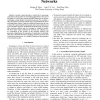Free Online Productivity Tools
i2Speak
i2Symbol
i2OCR
iTex2Img
iWeb2Print
iWeb2Shot
i2Type
iPdf2Split
iPdf2Merge
i2Bopomofo
i2Arabic
i2Style
i2Image
i2PDF
iLatex2Rtf
Sci2ools
101
click to vote
INFOCOM
2009
IEEE
2009
IEEE
Analysis of Adaptive Incentive Protocols for P2P Networks
— Incentive protocols play a crucial role to encourage cooperation among nodes in networking applications. The aim of this paper is to provide a general analytical framework to analyze and design a large family of incentive protocols. We consider a class of incentive protocols wherein peers can distributively learn and adapt their actions. Using our analytical framework, one can evaluate the expected performance gain and system robustness of a given incentive protocol. To illustrate the framework, we present three incentive policies and two learning (or adaptive) models. We show under what conditions the network may collapse (e.g., no cooperation in the system) or the incentive protocol can guarantee a high degree of cooperation. In particular, we formally show the connection between evaluating incentive protocols and evolutionary game theory so to identify robustness characteristics of an incentive policy.
Related Content
| Added | 24 May 2010 |
| Updated | 24 May 2010 |
| Type | Conference |
| Year | 2009 |
| Where | INFOCOM |
| Authors | Ben Q. Zhao, John C. S. Lui, Dah-Ming Chiu |
Comments (0)

